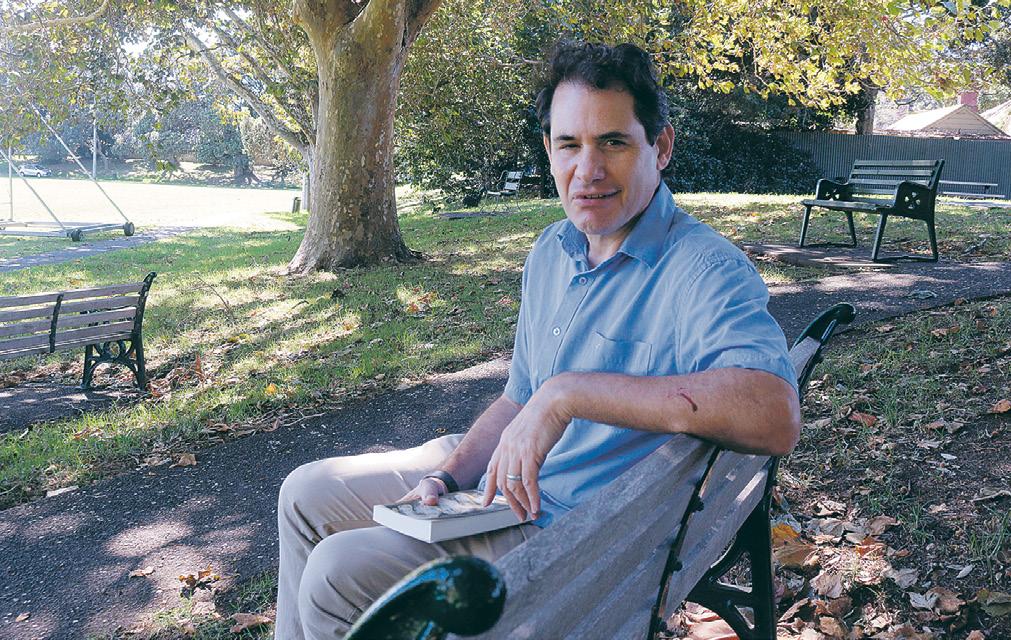
6 minute read
Interview: Writer Bryan Walpert
Former US newspaperman wins local literary acclaim
Bryan Walpert’s Entanglement has just been shortlisted as one of four fiction finalists in the Ockham Book Awards. He talks to Helen Vause about his journey in literature.
Write stuff... As a creative-writing teacher, Bryan Walpert stresses the need to take criticism on board
When he was a gutsy and dogged young reporter bailed up in a phone box by a couple of approaching villains, poetry and novels were a long way from Bryan Walpert’s mind. The recent graduate was every bit the young newspaperman, with a lust for nailing a great story and getting it into print fast. Back then, that was the way words worked for him.
Decades and many stories later, American-born-and-educated Walpert is a university professor living in Devonport with a couple of teenagers at Takapuna Grammar School. And now, when the Flagstaff talked to him, excited and delighted to have his novel Entanglement in the shortlist of four in the fiction category of the Ockhams, the country’s premier literary awards. “It’s a real honour,” says the modest professor who teaches creative writing at Massey University’s Albany Campus. “I had no expectation but every writer has a hope.” Walpert’s time-travel novel has had enthusiastic reviews since its publication at the start of summer. When the awards shortlist was announced last week, Rob Kidd, convenor of the judges for the category, called the book: “Dazzlingly intelligent and ambitious in scope.” Walpert’s tertiary education began in Rhode Island, at Brown University, where he saw himself preparing for a career in media by studying international relations. As a young graduate, he first found work in community newspapers and then moved into the more specialised world of business journalism. The reporter’s life saw him chasing after good guys and bad, asking the tricky questions in the very competitive quest for good copy. “At the time, I loved it.” But as he crept up the ranks as an editor

24 Hour Towing24 Hour Towing Devonport OwnedDevonport Owned and Operatedand Operated 1 Fleet Street, Devonport1 Fleet Street, Devonport Phone 445 0483Phone 445 0483 email: fleetst@ihug.co.nzemail: fleetst@ihug.co.nz email: office@fleetstpanel.co.nz www.fleetstpanel.co.nzwww.fleetstpanel.co.nz


Independent Financial Advice Individuals and Businesses
Call me for a no obligation chat email: david@davidsmart.co Phone: 027 543 4455 www.davidsmart.co
in business media, words were forming in a different pattern elsewhere in his mind, edging out the smell of newsprint: Walpert was discovering poetry.
“I knew I was falling in love with poetry and I was coming to realise that was what I wanted to explore” he recalls of the shift of focus that led him to quit his job for the uncertainty of freelancing and heading back to university.
Far from the fast pace of newsrooms and the giant US markets, he embarked on his masters in fine arts in Maryland, while still freelancing as a business writer then starting to teach writing in many forms.
Although many struggle to put words on paper and dread writing an essay or a report for their bosses, writing is now recognised as an important skill, says Walpert, and students from all fields are lining up to learn how to do it better.
“Writing is a tool for career advancement and there’s a lot students can learn to improve their skills. I’ve never met a student who can’t improve their writing.”
When Walpert had completed a PhD at the University of Denver, he remembers his family having reservations about his career prospects.
“When my father heard I had my PhD, he said, ‘That’s neat. Now what are you going to do with that?’” Finding work as an academic in the US was very challenging. Then a friend spotted a job for teaching creative writing at Massey University. Walpert thought it might be a long shot but arrived to his job in New Zealand in 2004, together with his wife.
He was aware of cultural differences when he first arrived at Massey’s Palmerston North campus. He felt he had to first get to grips with Kiwi idiom and interaction with others.
He noticed that his new colleagues tended to present themselves in a more understated way than his peers back home.
“At first I was self-conscious about my way of being, aware that I might be a bit ‘louder’. In the US I was used to having to ‘toot my horn’ just to get anyone to listen. Over there life had been more keyed up, more pressured, the queues were longer. When I go back home now, I notice how I have changed.”
But Walpert was learning fast about getting along with the locals. Hard at work in his office one day, he remembers a Massey colleague seemingly empathising, with the quip, ‘you must be flat out’. Walpert, who was very busy and far from prone on the sofa at the time, realised he’d just learned another bit of local lingo.
His writing – books, poetry, short stories, essays – has earned Walpert acclaim and awards here and overseas.
And with Entanglement, he’s spent a couple of years on a work where the stories of his characters – all set in different decades – become entangled in a multi-layered tale of love, desperation and physics.
Those characters are a memory-impaired time traveller wanting to correct a tragic mistake he made in 1976; a novelist in 2011 researching at the Centre for Time in Sydney and living a romance with a female philosopher; and a writer at a retreat in 2019, obsessed with the disintegration of his marriage. The book covers decades and continents, and explores complex questions of physics alongside the human psyche. Reviewers have loved Walpert’s fast, engaging style but noted that it demands the reader’s full attention to avoid getting lost in the back-and-forth time-travel sequences.
It’s a point Walpert is fully aware of. “I never underestimate the intelligence of readers.”
And he notes he had his own challenges making the time-travel threads work seamlessly through the stories.
“When it came to putting it all together, there were times when I wished I could stand over it and look down on the whole book all at once just to be sure that it all worked,” he says with a laugh.
He acknowledges the importance of another pair of eyes on the journey to getting pages into a book form: “My editor actually chucked out my favourite piece and she was right to do that. She saw what I hadn’t seen and had made an improvement.”
As a teacher of creative writing, Walpert stresses the importance of being able to take criticism and being willing to make changes to written work.
“If you want to write you have to be willing to seek honest feedback. With creative writing, it’s very useful to be in a roomful of other people who are also immersed in doing the same thing and who are working with an instructor who has been down the same road before them.”
But for anyone aspiring to write a book he warns it’s not a good idea to look for that honest feedback from family and friends, when personal feelings could influence reactions. He says useful criticism needs to be about the work, not the person.
During his teaching career, he’s seen a big growth in people signing up for courses as universities have significantly expanded the range of creative-writing courses on offer.
“There are just so many people who want to write. They feel they have stories they want to tell. It’s not uncommon for people to cry when they’re writing poetry or sharing something they’ve written.”
Creative-writing students come from all walks of life, at all ages, he says.
“They can be watercolourists or engineers. And it’s the scientists and engineers in class who often ask such great questions.”
Walpert is carrying on sharing his skills in creative-writing classes, maybe helping to shape the work of a future writing star.
The 2022 Ockham New Zealand Book Awards winners will be announced on 22 May.


